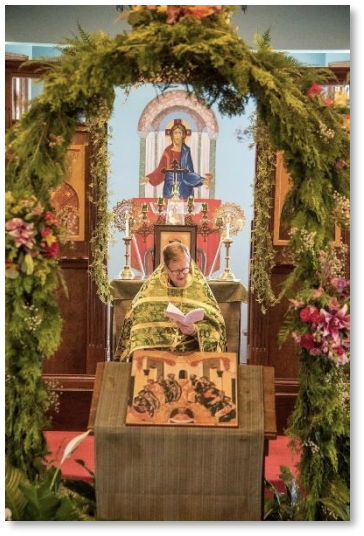Jesus Christ the Messiah
“…He is God, as being Son of God, and is everlasting King, and exists as Radiance and Expression of the Father, therefore fitly is He the expected Christ, whom the Father announces to mankind, by revelation to His holy prophets; that as through Him we have come to be, so also in Him all men might be redeemed from their sins, and by Him all things might be ruled.”
—St. Athanasius the Great1
Jesus Christ began his public preaching ministry after reading aloud these words from the great prophet Isaiah:
The Spirit of the LORD is upon Me,
Because He has anointed Me.
To preach the gospel to the poor;
He has sent Me to heal the brokenhearted,
To proclaim liberty to the captives.
And recovery of sight to the blind,
To set at liberty those who are oppressed;
To proclaim the acceptable year of the LORD. (Luke 4:18–19)
It is the anointed one, the Messiah, Jesus Christ, whom the prophets foresaw and spoke of. It was He to whom they looked to heal and liberate them from the deserts of the dissolution brought upon themselves through their disobedience and waywardness. After the reading of the prophet, our Lord told those assembled that the fulfillment of this prophecy was present in his presence. God himself has visited his people. As our Lord indicated the fulfillment of Isaiah in his advent, let us follow the prophet Isaiah further and see how he describes the messianic time, the “acceptable year of the Lord” (Isa 61).
With the advent of the Messiah, God’s vengeance upon his enemies will mean a day of comfort and consoling for the mourners in Zion. Israel will be restored to its ancient inheritance, because God will turn ashes into glory, anoint his beloved with the oil of joy, and bedeck his bride in “garments of salvation” and a “robe of righteousness”. This joyful event will be the occasion of the rebuilding of “old ruins” and the repair of “ruined cities”. In fact, the prophet speaks of this time of salvation as a fruitful garden where the plant of Israel shines forth in glory.
This glorious restoration of Israel to the edenic state of things is also the time in which Israel’s election as a kingdom of priests comes to fruition, as the Messiah has brought the Gentiles into this paradise alongside Israel. The time of dissolution, shame, and  alienation is past. The Messiah, the king, who is from the “root of Jesse” has blossomed forth and “the whole world is filled with the knowledge of the Lord (Isa 11).” Israel is in the messianic kingdom returned to being named “priests of the Lord” as the Gentiles turn to serve in this kingdom and become the new glory of Israel.
alienation is past. The Messiah, the king, who is from the “root of Jesse” has blossomed forth and “the whole world is filled with the knowledge of the Lord (Isa 11).” Israel is in the messianic kingdom returned to being named “priests of the Lord” as the Gentiles turn to serve in this kingdom and become the new glory of Israel.
The Church is the new Israel, as St. Paul tells us in the book of Romans, chapters 9–11. Whomever has called upon the name of the Lord and entered the Church, whether Jew or Gentile, has access to the benefits of the Messiah. The deserts have become verdant gardens, the desolate cities have been returned to glory, God himself has dwelt with his people and delivered them from the depth of their servitude, just like in the days of Moses when God led Israel out of Egypt and brought them to the promised land (Isa 11:15– 16). The testimony of the Law, Psalms, and Prophets is the true inheritance of the Church. Worship of God continues as revealed in Jesus Christ. For it was ultimately Jesus whom Moses encountered on Mt. Sinai and whom Isaiah encountered on the throne. It is the same enthroned King, the foretold messiah of Israel, that we daily encounter in our prayers and regularly receive in the Eucharist in the temples of God.
Read more: Jesus Christ (opens in a new tab), Gospels (opens in a new tab), Revelation (opens in a new tab), The Holy Trinity Revealed (opens in a new tab)
Footnotes
-
St. Athanasius, Discourse I Against the Arians in Nicene and Post-Nicene Fathers, Volume IV, Second Series, Chapters XII.49 and XII.50, 335. ↩